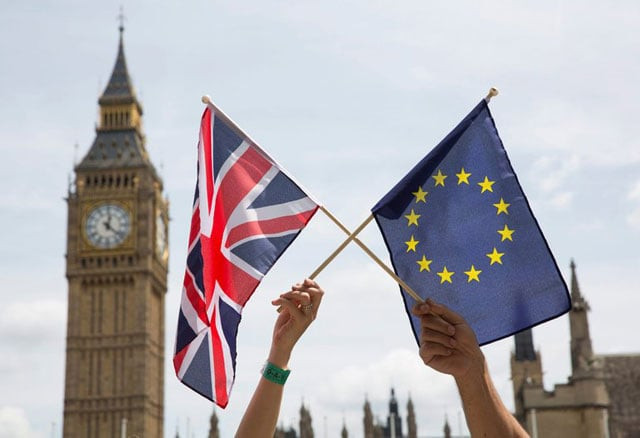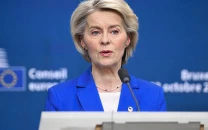Britain and EU face years of trade talks
Some pro-Brexiters in Britain argue that an EU deal make light of the challenges

Britain is set to become the first European Union member to leave the bloc following a referendum last year. PHOTO: AFP
Recent EU free trade agreements including ones with Canada and South Korea have taken at least five years to achieve, with negotiators bogged down in both tiny details and major headaches.
Efforts to reach a trade deal with the US have taken even longer and now stalled -- but insiders say Brexit could top the lot when it comes to difficulty.
Lurking over the trade talks is the prospect of no deal, known as "hard Brexit", a legal void that most observers believe could have grave consequences for Britain, but also the EU.
EU vows unity as Britain braces for Brexit
An EU-Britain deal would be the "biggest free trade deal ever struck, ... that goes far deeper than what happens for EU-Canada or EU-Korea," Ivan Rogers, who stepped down as Britain's ambassador to the European Union in January, told British MPs last month.
Both deals were followed by a bruising ratification process by the EU's national governments.
British Prime Minister Theresa May launched the two-year Brexit process on Wednesday, with the European Union insisting that issues like Britain's exit bill and the fate of EU citizens in Britain must be settled first.
But once those issues are settled, Britain and the EU will seek to sketch out a new future in the form of a far-reaching trade deal to cover all the issues currently covered by the single market.
Many in the EU have warned that it will be impossible to reach a deal before Britain leaves the EU in 2019, meaning it will need a transitional period under still-to-be-determined terms before a full agreement can be reached.
European Parliament Brexit negotiator Guy Verhofstadt recommended limiting any such transition to three years after Brexit.
But Rogers warned that London would stand far weaker on trade than the "world class" and highly experienced EU, with the British government having had no negotiators since the 1970s when it joined the bloc.
Some pro-Brexiters in Britain argue that an EU deal make light of the challenges.
Indeed, Britain is currently an integral member of the EU's single market, the most comprehensive international trade agreement there is. Why should hammering out a trade accord be difficult when your starting point is convergence?
To some degree this was true, analysts said.
"The previous experience of trade negotiations like TTIP or CETA doesn't actually matter," said Hosuk Lee-Makiyama, director of the ECIPE think tank, referring to talks with the United States and Canada.
"This divorce settlement is going to be built on the ... status quo," he said.
The starting point for trade deal with Canada was no agreement while "the status quo in Brexit is actually an agreement," he said, speaking at a conference in Brussels on the consequences of Brexit.
That is not the rhetoric of the EU's chief Brexit negotiator Michel Barnier, who has ruled out negotiating a trade deal before the official divorce is settled, nor of German Chancellor Angela Merkel.
Barnier has threatened that a nasty divorce with no trade deal would condemn Britain to the status of a mere "third country", guided only by World Trade Organization rules.
Rogers said this would leave Britain out in the cold.
Becoming a third country would be an ultimate indignity for Britain -- third countries in EU-speak are automatically slapped with higher tariffs and a raft of regulatory barriers.
Britain delivers letter launching Brexit process
The vast majority of world countries are not in that category, having hammered out little-known deals on various sectors and products. The United States has at least 20 of these deals with the EU, Rogers said.
Barnier described the potential dangers of zero-deal for London: queues of backed up trucks at Dover, lower growth and a regulatory void that would spook foreign investors from Britain.
"While low, that risk is not zero," said Berenberg Bank analyst Kallum Pickering.
"The issues that led to Brexit in the first place could again turn into points of contention," he said.



















COMMENTS
Comments are moderated and generally will be posted if they are on-topic and not abusive.
For more information, please see our Comments FAQ